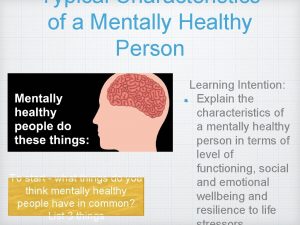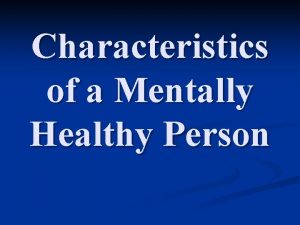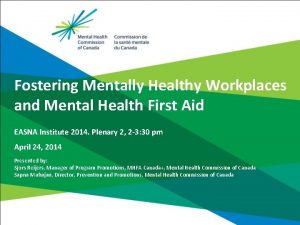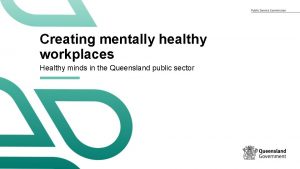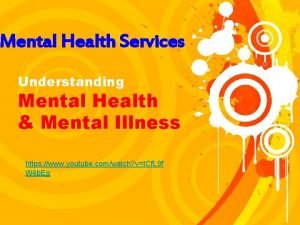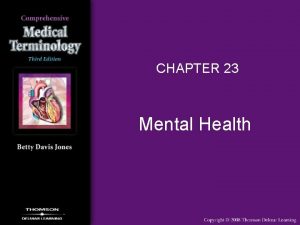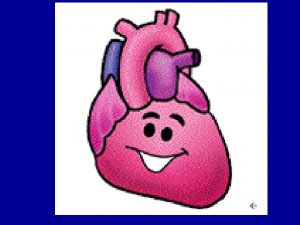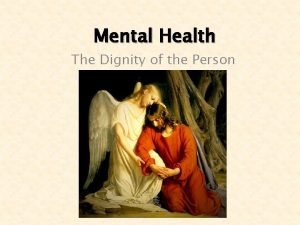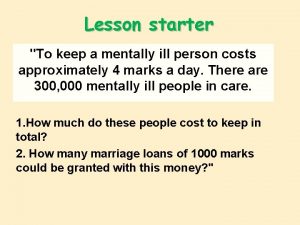MENTAL HEALTH A mentally healthy person is ready
























- Slides: 24

MENTAL HEALTH

A mentally healthy person is ready to cope with what life has to offer. There would be problems that are caused by interpersonal relations or by the demands of work which may affect one’s health.

MENTAL HEALTH WHO defines positive mental health as “a state of wellbeing in which an individual realizes his/her own abilities, can cope with the normal stresses of life, can work productively and is able to make a contribution to his/her community. ”

Good mental health isn't just the absence of mental health problems. Being mentally or emotionally healthy is much more than being free of depression, anxiety, or other psychological issues. Rather than the absence of mental illness, mental and emotional health refers to the presence of positive characteristics.

Similarly, not feeling bad is not the same as feeling good. While some people may not have negative feelings, they still need to do things that make them feel positive in order to achieve mental and emotional health.

CHARACTERISTICS OF A MENTALLY HEALTHY PERSON Positive Self-concept Sense of Responsibility Better Relationships with Other People Adaptability to Change Ability to Face Shortcomings or Disappointments Ability to Face Problems Squarely Ability to Accept Criticism

FACTORS AFFECTING MENTAL HEALTH Hereditary Physical Factor Socio-cultural Factor

Heredity The physical or mental characteristics that parents pass on to their children Genes

Physical Studies show that an individual who is often sick or malnourished or may have disabilities tends to be slow in his/her movement and oftentimes is weary and withdrawn.

Socio-cultural People surrounding a person will have a big impact on his/her mental health. The individual develops attitudes and behavioral patterns from the experiences he/she receives from the

FACTORS THAT HELP DEVELOP GOOD MENTAL HEALTH Physical Health Flexible disposition Parents and the home Habit training during childhood Ethical and moral upbringing Personal efforts to practice mental hygiene A balance between work and play, rest and activity, etc. A zest for living and the ability to laugh and have fun

Physical Health

Flexible disposition

Parents and the home

Habit training during childhood

Ethical and moral upbringing

Personal efforts to practice mental hygiene “Be easy, don't make decisions when you’re mad. . ” –LL Cool J (All I Have)

A balance between work and play, rest and activity, etc.

A zest for living and the ability to laugh and have fun

Some tips to improve mental health Do things that positively impact others. Being useful to others and being valued for what you do can help build self-esteem. Practice self-discipline. Self-control naturally leads to a sense of hopefulness and can help you overcome despair, helplessness, and other negative thoughts. Learn or discover new things. Think of it as “intellectual candy”. Try taking an adult education class, join a book club, visit a museum, learn a new language, or simply travel somewhere new.

Enjoy the beauty of nature or art. Studies show that simply walking through a garden can lower blood pressure and reduce stress. The same goes for strolling through a park or an art gallery, hiking, admiring architecture, or sitting on a beach. Manage your stress levels. Stress takes a heavy toll on mental and emotional health, so it’s important to keep it under control. While not all stressors can be avoided, stress management strategies can help you bring things back into balance. Limit unhealthy mental habits like worrying. Try to avoid becoming absorbed by repetitive mental habits – negative thoughts about yourself and the world that suck up time, drain your energy, and trigger feelings of anxiety, fear, and depression.

Appeal to your senses. Stay calm and energized by appealing to the five senses: sight, sound, touch, smell, and taste. Listen to music that lifts your mood, place flowers where you will see and smell them, massage your hands and feet, or sip a warm drink. Engage in meaningful, creative work. Do things that challenge your creativity and make you feel productive, whether or not you get paid for it – things like gardening, drawing, writing, playing an instrument, or building something in your workshop. Get a pet. Yes, pets are a responsibility, but caring for one makes you feel needed and loved. There is no love quite as unconditional as the love a pet can give. Animals can also get you out of the house for exercise and expose you to new people and places.

Make leisure time a priority. Do things for no other reason that it feels good to do them. Go to a funny movie, take a walk on the beach, listen to music, read a good book, or talk to a friend. Doing things just because they are fun is no indulgence. Play is an emotional and mental health necessity. Make time for contemplation and appreciation. Think about the things you’re grateful for. Mediate, pray, enjoy the sunset, or simply take a moment to pay attention to what is good, positive, and beautiful as you go about your day.

References Our World of MAPEH IV http: //www. helpguide. org/mental/ment al_emotional_health. htm
 Characteristics of a healthy person
Characteristics of a healthy person Characteristics of mentally healthy person
Characteristics of mentally healthy person Dr angel rodriguez-chevres
Dr angel rodriguez-chevres Stay ready to keep from getting ready
Stay ready to keep from getting ready Mental health and mental illness chapter 20
Mental health and mental illness chapter 20 Mental health jeopardy questions
Mental health jeopardy questions 2. person singular
2. person singular Third person point of view example
Third person point of view example Person person = new person()
Person person = new person() Reflexive pronouns
Reflexive pronouns Healthy food healthy mind journal
Healthy food healthy mind journal Healthy soil healthy life poster ideas
Healthy soil healthy life poster ideas Healthy forests healthy communities poster contest
Healthy forests healthy communities poster contest Healthy nurse healthy nation
Healthy nurse healthy nation Barbara is a very healthy person
Barbara is a very healthy person Multiplying fractions mentally
Multiplying fractions mentally Lesson 3 add and subtract mentally
Lesson 3 add and subtract mentally How to divide fractions mentally
How to divide fractions mentally What are the parts of a subtraction problem
What are the parts of a subtraction problem Previewing helps the audience mentally organize a speech.
Previewing helps the audience mentally organize a speech. Which design principle involves mentally dividing
Which design principle involves mentally dividing Corporate athlete model
Corporate athlete model Mentally spiritually physically emotionally
Mentally spiritually physically emotionally Language
Language Assimilate mentally
Assimilate mentally
